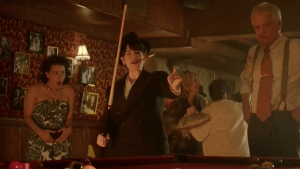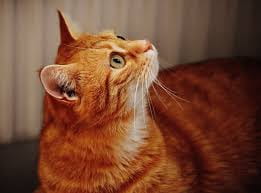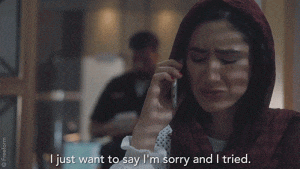The writing in Wynonna Earp is mediocre at best, specifically the character writing. Not only are the characters all tropes, but they are also written in an incredibly boring manner. I will focus in on Episode 2 to give a closer look at how sucky the writing truly is.
I’d like to start first with Agent Dolls, a character so one-dimensional every conversation he has is the same. To be fair, it does not help he only interacts with one character, Wynonna, but he still fails at having any character traits other than serious. Dolls is ALWAYS talking about work and he ALWAYS sounds threatening. Most of the time he is talking to Wynonna, who is never serious, but even when he has a chance to talk to another character, he fails. When Officer Haught comes in to his makeshift office, he threatens her with death if she ever barges in again. Dolls is a simple character whose only motivation appears to be destroying the demons. Even when Dolls has a redeeming moment, saying he argued against the destruction of the town in New Mexico, the show does not explore it in any depth. Unfortunately for the show, Dolls is a totally weak character with no unique qualities.
Wynonna, the title character, is not written much better than Dolls. Admittedly, she does have more than one side. She has two sides. Wynonna’s first side is when she is speaking to Dolls. Here the show writes her as the exact opposite of him. When he is strict, she takes events with levity. Wynonna’s responses almost always consist of some wise-crack that usually fails to include any semblance of humor. I think the show is trying to portray her as a bad-ass that doesn’t take orders from authority, but instead she seems like an asshole. Dolls is usually trying to help, but Wynonna just makes a stupid joke. Wynonna’s second side is used when she is talking to her sister, Waverly. In these interactions Wynonna actually seems like a real human being. She speaks like a normal older sister would to her little sister, except she can’t resist cracking jokes. For some reason, the writers have Wynonna make wise-cracks while she is comforting her sister. Overall, Wynonna is a failure as the main character of the show. She has a flat personality and she fails to be even a little funny.

An example of Wynonna’s terrible one-liners





